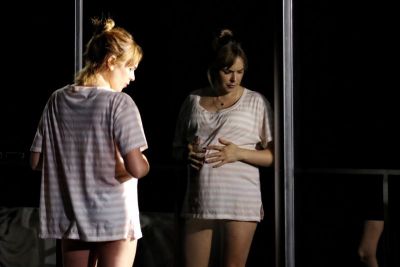Lethal Indifference
In a grey-carpeted Melbourne flat on an upper floor, with rolling doors to a small balcony, sits a sweet, chatty, pregnant woman. With her distinctive New Zealand vowel sounds, Emily Barclay tells us how she moved from handing out Green how-to-vote cards at a council election to lucking a job as Media Adviser at a Family Violence Centre.
She does this well and, when she removes her dress because it’s hot in Melbourne at this time of the year — she’s really heavily pregnant. Will she make it to the 10th March end of the run? There’s no mention in the program of any backup for her. Understudying a 90-minute solo show is no small thing.
In front of a whirling fan or sprawling on her bed, she tells, in the script by Anna Barnes, of one particular case that has troubled her — Reema and Ajay. A change in circumstances leads to Reema being locked in their house, how she escapes after a week and eventually moves an intervention order against her husband. Furiously, Ajay pursues and harasses Reema.
 Alerted and troubled, our woman tunes into the stories of other Melbourne couples — there’s one close by, along the corridor, in fact. She intervenes, but not enough. Women are victims or survivors: grunts of approval from members of the audience.
Alerted and troubled, our woman tunes into the stories of other Melbourne couples — there’s one close by, along the corridor, in fact. She intervenes, but not enough. Women are victims or survivors: grunts of approval from members of the audience.
There’s no doubt about the ability and focus of Emily Barclay in this world premiere. She’s first rate as a woman who, almost by accident, stumbles over one of today’s major issues — ‘it takes a whole community to kill a woman’, she says. And the work of director Jessica Arthur gives great backing to her.
But – the setting remains a problem. Why are events related from this grey Melbourne flat, rather than, say, the Family Violence Centre? Where is her husband/boyfriend?
Frank Hatherley
Subscribe to our E-Newsletter, buy our latest print edition or find a Performing Arts book at Book Nook.

